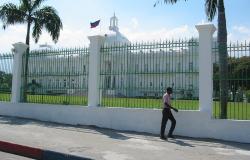Taking Accountability for Haiti’s Democracy

Euvrard Saint-Amand, Haitian Ambassador to the United Kingdom, on why the international community has an important role supporting Haiti's constitutional reform and upcoming legislative, local, and presidential elections.
Last week’s joyful scenes at the inauguration of the 46th President of the United States were in stark contrast to the US Capitol riots only two weeks earlier, which led many to question the image of the US as a bastion of global democracy. However, with President Biden now sworn in, the structures underpinning America’s democracy once more proved successful. Central to all of this was the legacy of the US Constitution, which for over 200 years has provided the bedrock for American democracy.
Some 3,000 kilometers off the coast of the US is Haiti, the world’s first Black-led republic. Like the US, Haiti is a democracy, but unlike the US, Haiti does not have a strong constitution. This difference is part of the reason for the huge disparity in wealth and stability between two countries effectively bordering one another.
Sadly, for Haitians, the scenes of the US Capitol riots are eerily familiar. For years Haitians have grown accustomed to violent protest and political instability borne from a poorly conceived Constitution which has proved difficult to reform.
Under the current Constitution, there is a huge power discrepancy between the executive and legislative branches. At present, the smallest minority of legislators can block crucial acts of government on political whims, can even prevent elections from taking place on time. On five occasions since 1987, Haitian Presidents have been left to govern without a functioning parliament and by executive order because legislative elections were not held. This cycle needs to be broken.
According to a recent poll conducted by the Haiti Nou Vle Association, 86% of Haitians agree that the country needs a new Constitution. That poll followed another one conducted and published at the end of December 2020 by the “Bureau de Recherche en Informatique et en Developement Economique et Social” (BRIDES) in which more than 87% of Haitians agreed upon the change of the constitution of 1987. The President of Haiti, Jovenel Moise, is acutely aware of this and made constitutional reform a key platform when he came into office.
Without a functioning Constitution, there can be no elections, and without elections Haitians cannot hold accountable those who wield power. This is the foundation of a functioning democratic state, and something Haiti is desperate for.
The good news is that much has been done to make this a reality. An independent advisory committee has been appointed and is ready to deliver a revised Constitutional draft in the coming weeks, and a referendum is expected in April. If approved, the new Constitution will recalibrate the balance of power between the executive, legislative and judicial branches, ensuring that no single branch is able to stall the political process. There is clearly a lot riding on this, as without a stable political environment the country will never reach its full potential.
The question of Haiti’s potential is an important one. Since taking up the role of Haiti’s Ambassador to the UK, I’ve seen first-hand that people tend to view the country through a humanitarian lens. Little is known about Haiti’s rich culture and history, this tends to be overshadowed by more negative stories. I intend to change this.
With oil reserves potentially larger than Venezuela, and an estimated offshore formation of up to 3 million barrels, as well as an abundance of opportunities in the renewable energy, agriculture, and tourism sectors – it’s time to take a less one-dimensional look at Haiti. The world has largely ignored these opportunities and focused on Haiti’s turbulent politics, but under President Moise, we are trying to transform into a stronger democracy with functioning political structures.
To do this we need international support.
Since I arrived in London, I’ve been meeting with politicians in the UK who are keen to support Haiti’s democratic transition. The UK can play a vital role in providing technical support and knowledge sharing to help build capacity in Haiti to carry out our ambitious plans for Constitutional reform and upcoming legislative, local, and presidential elections. Those elections are vital to the country’s future for they will help to strengthen the institutions and transfer of power at the end of the current presidential term 0n February 7th, 2022. In turn, a stable Haiti can help foster the economic opportunities now available to the UK following its decision to leave the European Union.
As conversations about the strength of democracy in the world continue, the international community must appreciate what messages of support for Haiti’s democracy sends out. This is not just about strengthening democracy in Haiti at its crossroads moment, it's about reinvigorating democracy around the world at a time when these signals, and this shared commitment, are greatly needed.
Euvrard Saint-Amand, Haitian Ambassador to the United Kingdom.
Image: Photo RNW.org via Flickr (CC BY-ND 2.0)


